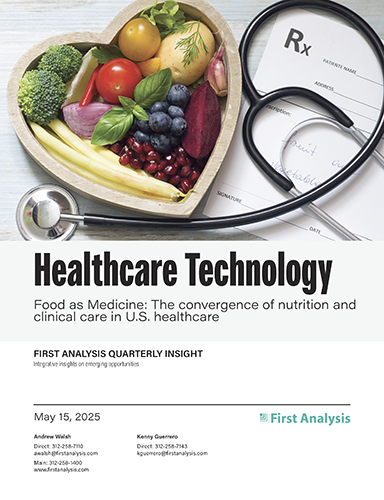Quarterly insights: Healthcare technology
Food as Medicine: The convergence of nutrition and clinical care in U.S. healthcare

Food as Medicine has established a foothold in the U.S. healthcare system. The Food as Medicine concept holds that interventions that align patients’ diets with their clinical needs—such as medically tailored meals, customized groceries, and produce subsidies—have the potential to improve health outcomes while reducing total cost of care.
Under Robert F. Kennedy Jr.’s leadership of U.S. healthcare policy, adoption of Food as Medicine in the U.S. healthcare system could be significantly accelerated—or redefined. In Kennedy’s Make America Healthy Again vision, nutrition is not a supplemental benefit, but a foundational element of chronic disease prevention and health restoration.
The vendor ecosystem supporting Food as Medicine is becoming increasingly sophisticated, but standardized outcomes measurement and integration with payer and provider workflows remain common challenges. As Food as Medicine programs mature, we think vendors with clinical credibility, scalable operations and strong data infrastructure will be best positioned to win share.
We outline the evolution of Food as Medicine in the U.S. healthcare system, examine key new developments likely to affect its future, and highlight some of the companies building businesses to address this emerging market.
TABLE OF CONTENTS
Includes discussion of six private companies
- The rise of Food as Medicine
- The clinical rationale and cost imperative
- Medicare Advantage and the role of supplemental benefits
- Medicaid waivers and the state-led push
- Risk-bearing providers and ACO adoption
- Federal policy and emerging regulatory pathways
- The vendor landscape: Logistics meets engagement
- Evidence base and outcomes measurement
- Strategic outlook: RFK Jr. and the MAHA platform
- Promising path to realize Food as Medicine’s transformational potential
- Healthcare index gain masks declines at most constituents
- Healthcare tech M&A: Notable transactions include NextGen Healthcare, UpLift
- Healthcare tech private placements: Notable transactions include Blooming Health, Nourishdress this emerging market.
The rise of Food as Medicine
Over the past decade, the concept of Food as Medicine has evolved from a public health talking point into a serious clinical and reimbursement framework. This transformation reflects a broader shift in healthcare—away from reactive treatment and toward management of chronic illness, health equity, and social determinants of health. Food as Medicine programs now range from medically tailored meals to produce “prescriptions,” and their integration into health insurance benefits—particularly in Medicare Advantage and Medicaid—is accelerating. At the same time, a new generation of vendors is emerging to deliver these services, often with a combination of physical logistics, patient engagement tools and clinical reporting infrastructure.
This report explores the rise of Food as Medicine as a reimbursable healthcare benefit, examining the macro-level cost and policy drivers, the evolving posture of payers and providers, and the strategies of leading vendors. While state-level initiatives have played a catalytic role, this report concentrates on national-level trends and payer-specific dynamics that are shaping the future of this emerging sector.
The clinical rationale and cost imperative
The underlying thesis of Food as Medicine is that diet-related disease is both preventable and expensive. In the United States, over 70% of annual healthcare spending is associated with chronic conditions such as heart disease, diabetes, obesity and hypertension. Many of these conditions are caused or exacerbated by poor nutrition. As such, interventions that align patients’ diets with their clinical needs—such as medically tailored meals, customized groceries, and produce subsidies—have the potential to improve outcomes while reducing total cost of care.
This promise is increasingly attractive to health plans, accountable care organizations, and policymakers facing mounting pressure to curb avoidable hospitalizations, emergency department visits and polypharmacy (the regular use of five or more medications at the same time). In tandem, social determinants of health (SDOH), particularly food insecurity, have gained recognition as key contributors to poor health outcomes. Payers and providers alike are beginning to treat nutritional support as a legitimate medical intervention, particularly for populations with complex, chronic needs.

Request full report
To access the full report, please provide your contact information in the form below. Thank you for your interest in First Analysis research.
